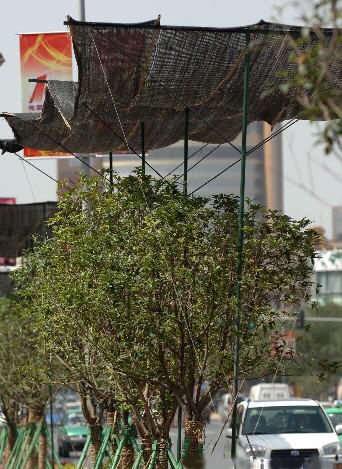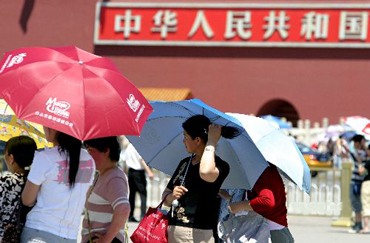| Home / English Column / Environment / Environment -- What's New | Tools: Save | Print | E-mail | Most Read |
| Hot Weather Comes Early |
| Adjust font size: |
Scorching weather has come to many parts of China three weeks earlier than it should according to traditional Chinese lunar calendar.
Scorching weather now starts earlier and lasts longer in many parts of the country, particularly in northern China. It was quite rare for temperatures to surpass 40 ℃ two or three decades ago, but this is now a frequent occurrence. Very few urban homes or offices used air conditioners to keep cool back in the early 1980s. Thanks to air conditioners, many urban families now enjoy cooler summers in their homes, offices and cars than they did three decades ago. People cannot say for certain how much the use of air conditioners and cars has contributed to the rise of temperature in urban areas, but it undoubtedly has. In this sense, people have acquired their comfort at the expense of the climate. The mushrooming of high-rise buildings and the reduction in the number of trees have also contributed to rising temperatures in our cities. The average temperature in Beijing on Sunday was 35 ℃, but it was more than 3 ℃ higher in southern Beijing than in the west of the city, where more trees absorbed the heat. The temperature was even lower in the remote suburban areas, where there are more trees and fewer high buildings.
This fact speaks volumes about the relationship between urban life and hot weather, as well as the side effects of using too much concrete and asphalt in urban development. Trees are a very rare sight in most of Beijing's newly developed residential areas. This is probably because trees do not bring economic benefits to real estate developers. Summer temperatures are set to rise even further if Beijing becomes home to even more high-rises and even more concrete is used. As a result, residents will have to use air conditioners more frequently both in their homes and their cars, which will then contribute to a further hike in the temperature. It has therefore become a vicious circle. But there is a limit to the temperature that people can endure. What if the temperature rises to 50 ℃ over the next 50 years if people continue to follow the same urban development model? To break such a vicious circle, people need a long-term view in the planning of our cities. People must leave more room for trees in urban areas to maintain an ecological balance. Otherwise, people will find it more and more uncomfortable or even impossible to stay in urban areas. (China Daily June 20, 2006)
|
| Tools: Save | Print | E-mail | Most Read |
 |
| Related Stories |
|

